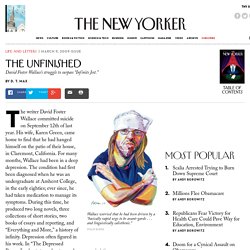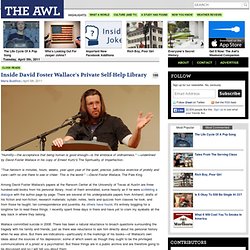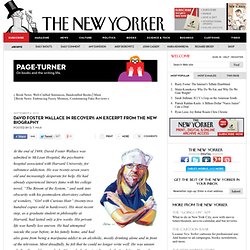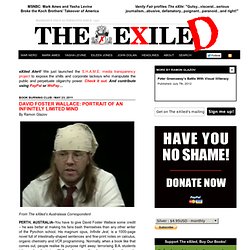

David Foster Wallace on Why You Should Use a Dictionary, How to Write a Great Opener, and the Measure of Good Writing. By Maria Popova “Readers who want to become writers should read with a dictionary at hand,” Harvard psycholinguist Steven Pinker asserted in his indispensable guide to the art-science of beautiful writing, adding that writers who are “too lazy to crack open a dictionary” are “incurious about the logic and history of the English language” and doom themselves to having “a tin ear for its nuances of meaning and emphasis.” But the most ardent case for using a dictionary came more than a decade earlier from none other than David Foster Wallace. In late 1999, Wallace wrote a lengthy and laudatory profile of writer and dictionary-maker Bryan A. Garner. A correspondence ensued, which became a friendship, which sprouted a series of conversations about writing and language, eventually published as Quack This Way: David Foster Wallace & Bryan A.
At one point, the conversation turns to the underappreciated usefulness of usage dictionaries. Reading is a very strange thing. The Unfinished. The writer David Foster Wallace committed suicide on September 12th of last year.

His wife, Karen Green, came home to find that he had hanged himself on the patio of their house, in Claremont, California. For many months, Wallace had been in a deep depression. The condition had first been diagnosed when he was an undergraduate at Amherst College, in the early eighties; ever since, he had taken medication to manage its symptoms. During this time, he produced two long novels, three collections of short stories, two books of essays and reporting, and “Everything and More,” a history of infinity.
Depression often figured in his work. 30 Free Essays & Stories by David Foster Wallace on the Web. David Foster Wallace. Read 30 Free Essays & Stories by David Foster Wallace on the 5th Anniversary of His Death. Inside David Foster Wallace’s Private Self-Help Library. "Humility—the acceptance that being human is good enough—is the embrace of ordinariness.

" —underlined by David Foster Wallace in his copy of Ernest Kurtz's The Spirituality of Imperfection. "True heroism is minutes, hours, weeks, year upon year of the quiet, precise, judicious exercise of probity and care—with no one there to see or cheer. This is the world. " —David Foster Wallace, The Pale King Among David Foster Wallace's papers at the Ransom Center at the University of Texas at Austin are three hundred-odd books from his personal library, most of them annotated, some heavily as if he were scribbling a dialogue with the author page by page. Wallace committed suicide in 2008. One surprise was the number of popular self-help books in the collection, and the care and attention with which he read and reread them.
All his life, he'd been the smartest boy in class, the gifted athlete, the super brain, the best writer. But Wallace had already learned to mistrust such praise. Mrs. An Excerpt from "Every Love Story is a Ghost Story: A Life of David Foster Wallace" At the end of 1989, David Foster Wallace was admitted to McLean Hospital, the psychiatric hospital associated with Harvard University, for substance addiction.

He was twenty-seven years old and increasingly desperate for help. He had already experienced literary fame with his college novel, “The Broom of the System,” and sunk into obscurity with his postmodern short-story cabinet of wonders, “Girl with Curious Hair” (twenty-two hundred copies sold in hardcover). His most recent stop, as a graduate student in philosophy at Harvard, had lasted only a few weeks. His private life was hardly less uneven. He had attempted suicide the year before, in his family home, and had also gone from being a marijuana addict to an alcoholic, mostly drinking alone and in front of the television. The four weeks Wallace spent at McLean in November 1989 changed his life.
Wallace was placed in a facility for alcoholics and depressives, with a large room for twelve-step meetings. Not that things came easily. David Foster Wallace: Portrait Of An Infinitely Limited Mind - By Ramon Glazov. From The eXiled’s Australasia Correspondent PERTH, AUSTRALIA–You have to give David Foster Wallace some credit – he was better at making his fans bash themselves than any other writer of the Pynchon school.

His magnum opus, Infinite Jest, is a 1000-page novel full of intestinally-shaped sentences and fine-print notes on calculus, organic chemistry and VCR programming. Normally, when a book like that comes out, people realise its purpose right away: terrorising B.A. students into meek submission. Wallace, however, found a very shrewd way to counter this by pretending that his work was really “a late-night conversation with really good friends, when the bullshit stops and the masks come off.” So instead of menacing the reader in the old Joycean way, Wallace chums it up whenever the technical stuff appears, acting like he really doesn’t mean to discourage anyone. So far, it’s worked well. Dave Eggers is even more shameless in his introduction to Infinite Jest’s 10th-anniversary edition.